人教版八下Unit 1 What's the matter? SectionA词汇精讲课件
文档属性
| 名称 | 人教版八下Unit 1 What's the matter? SectionA词汇精讲课件 |
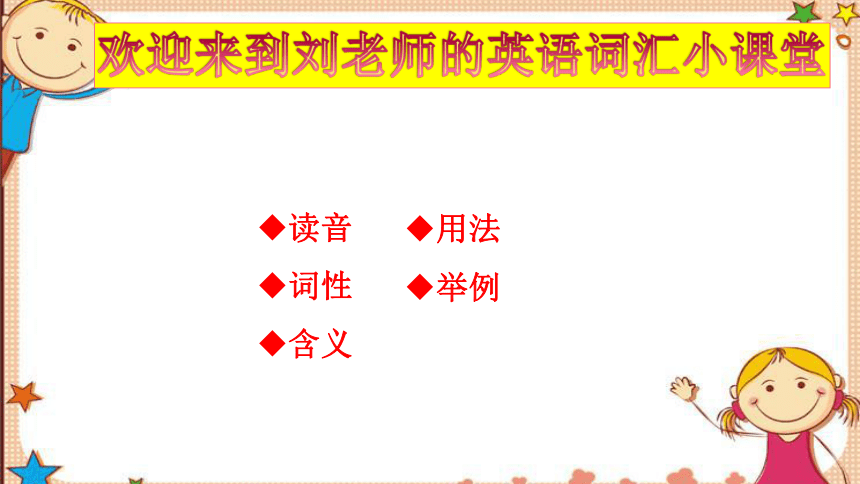
|
|
| 格式 | pptx | ||
| 文件大小 | 2.0MB | ||
| 资源类型 | 试卷 | ||
| 版本资源 | 人教新目标(Go for it)版 | ||
| 科目 | 英语 | ||
| 更新时间 | 2024-07-01 11:35:18 | ||
图片预览

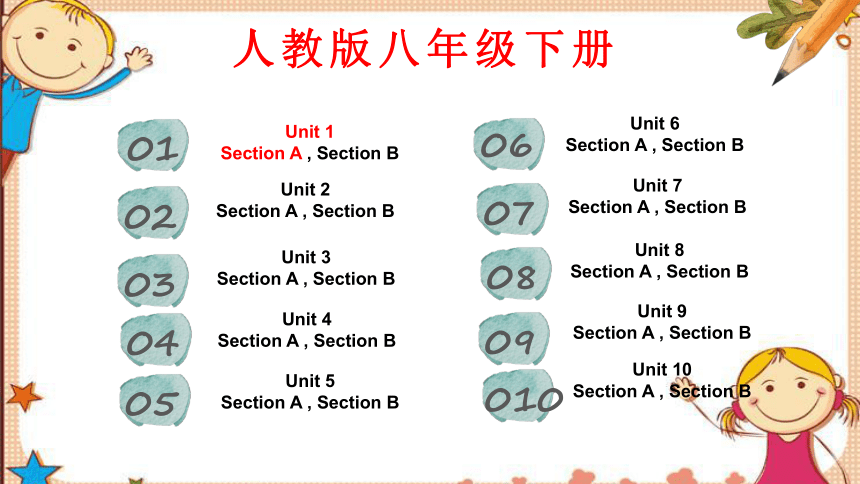
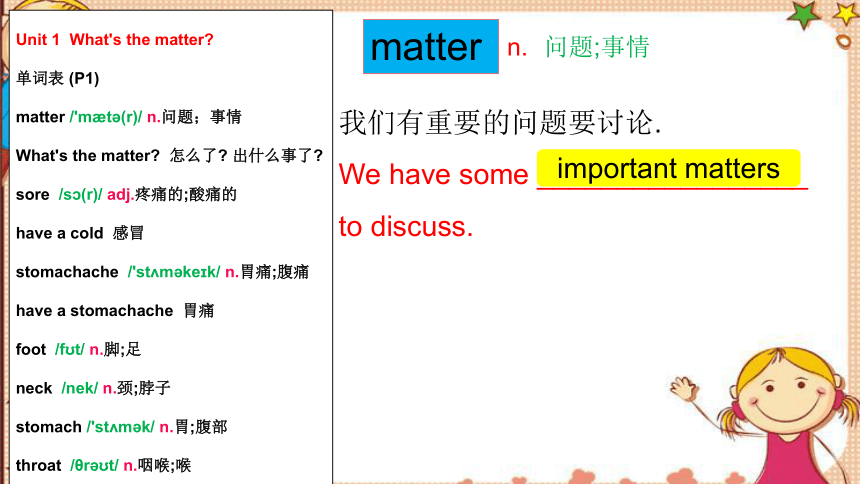
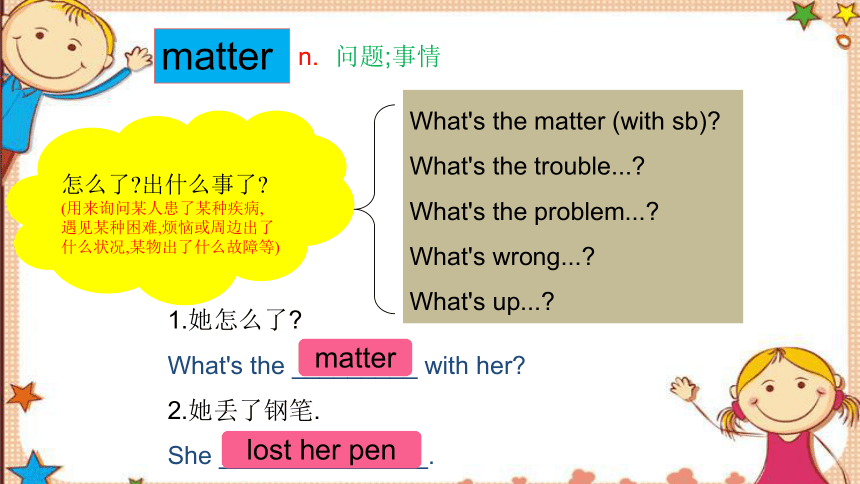
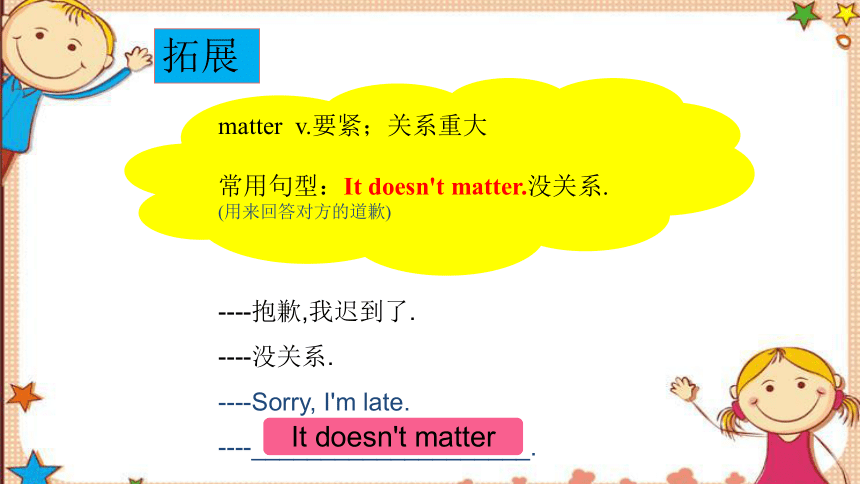
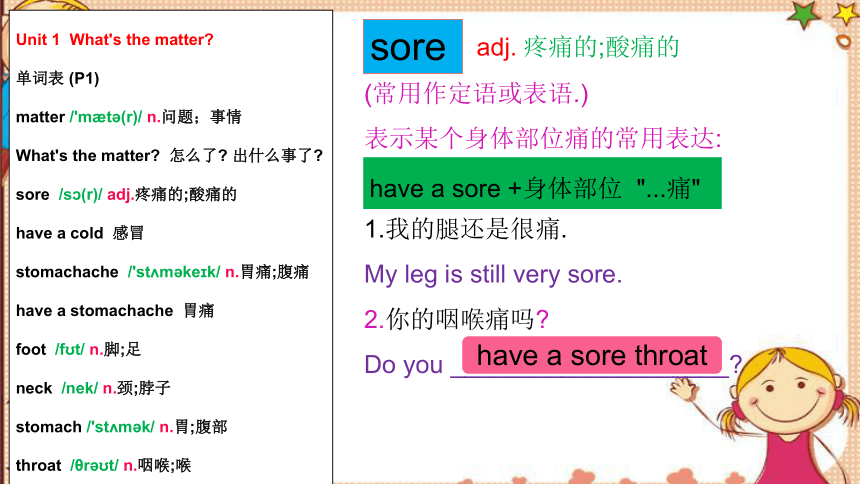
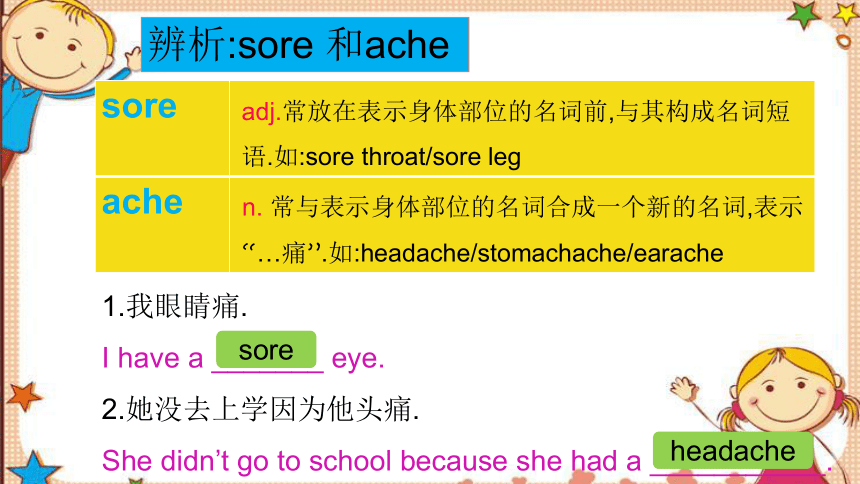
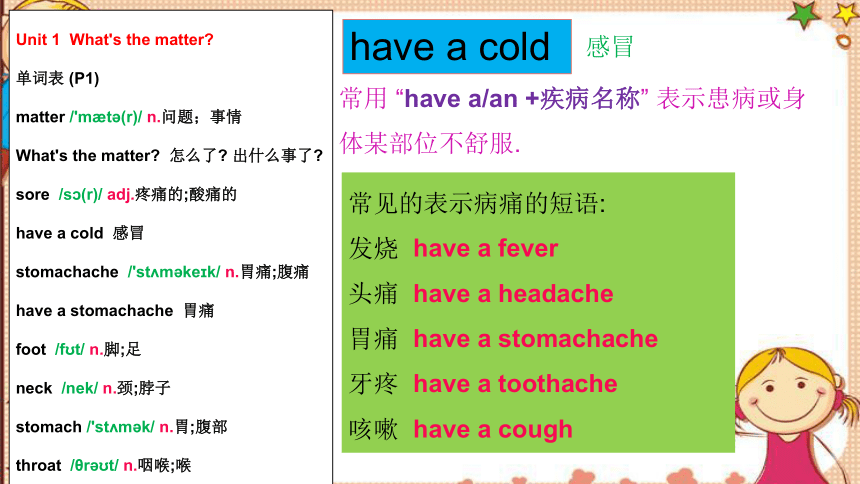
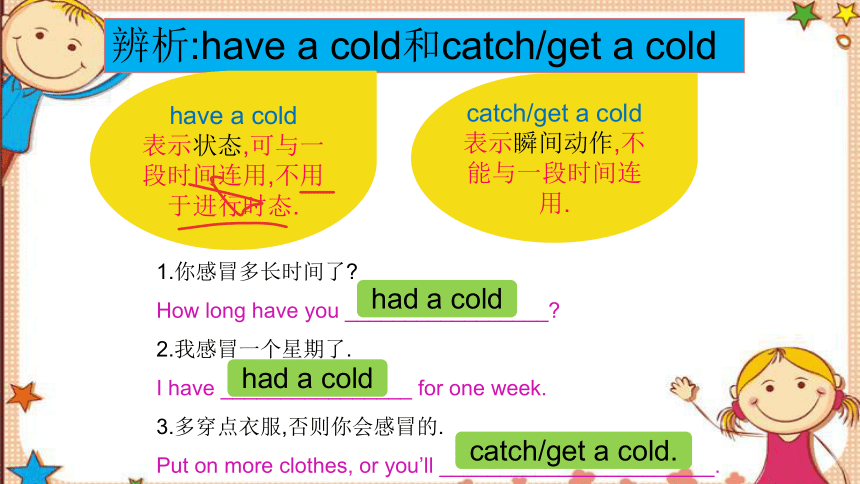
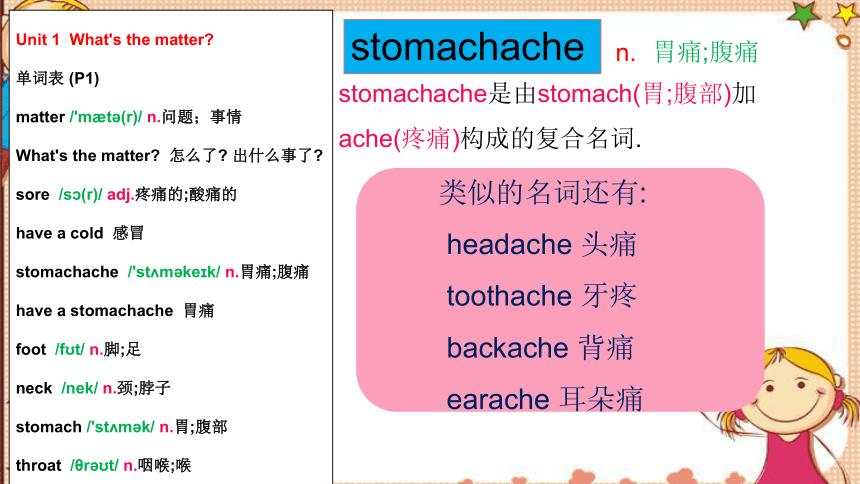
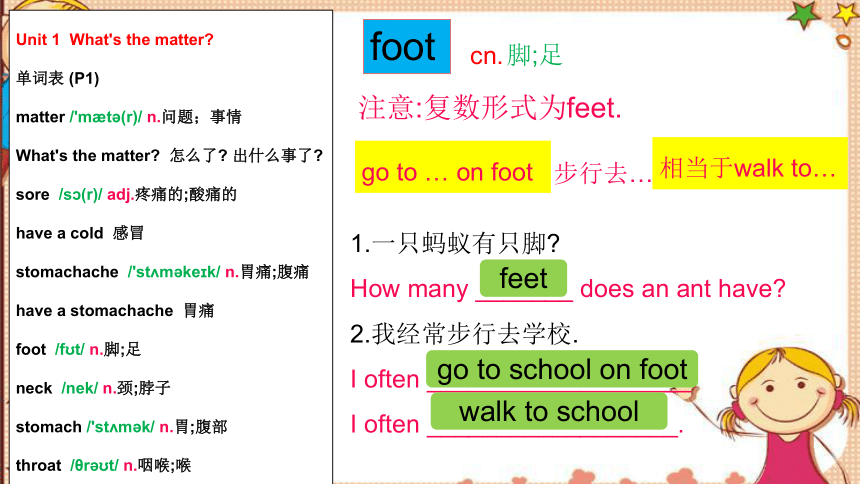
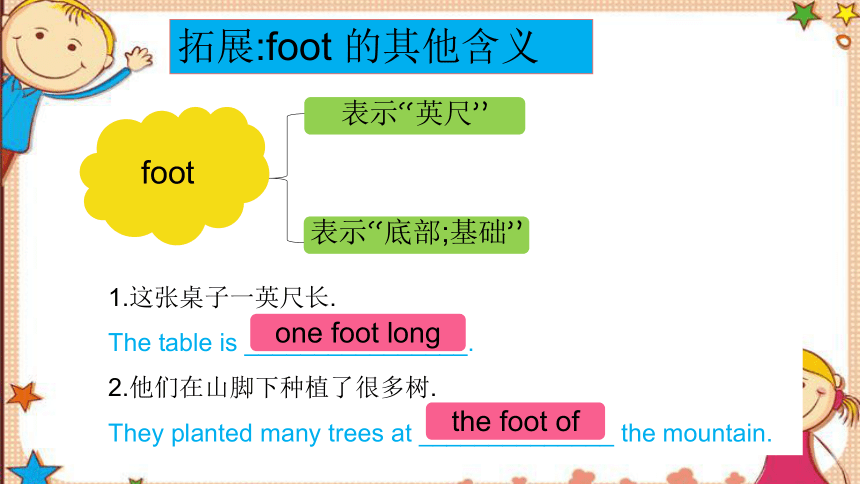
文档简介
(共39张PPT)
Destiny制作
读音
词性
含义
欢迎来到刘老师的英语词汇小课堂
用法
举例
人教版八年级下册
Unit 1
Section A , Section B
01
06
02
07
03
04
05
010
09
08
Unit 2
Section A , Section B
Unit 6
Section A , Section B
Unit 5
Section A , Section B
Unit 4
Section A , Section B
Unit 3
Section A , Section B
Unit 10
Section A , Section B
Unit 9
Section A , Section B
Unit 8
Section A , Section B
Unit 7
Section A , Section B
Unit 1 What's the matter
单词表 (P1)
matter /'m t (r)/ n.问题;事情
What's the matter 怎么了 出什么事了
sore /s (r)/ adj.疼痛的;酸痛的
have a cold 感冒
stomachache /'st m ke k/ n.胃痛;腹痛
have a stomachache 胃痛
foot /f t/ n.脚;足
neck /nek/ n.颈;脖子
stomach /'st m k/ n.胃;腹部
throat /θr t/ n.咽喉;喉
matter
n.
问题;事情
我们有重要的问题要讨论.
We have some _________________ to discuss.
important matters
matter
n.
问题;事情
What's the matter (with sb)
What's the trouble...
What's the problem...
What's wrong...
What's up...
怎么了 出什么事了
(用来询问某人患了某种疾病,遇见某种困难,烦恼或周边出了什么状况,某物出了什么故障等)
她怎么了
What's the _________ with her
2.她丢了钢笔.
She _______________.
matter
lost her pen
拓展
matter v.要紧;关系重大
常用句型:It doesn't matter.没关系.
(用来回答对方的道歉)
----抱歉,我迟到了.
----没关系.
----Sorry, I'm late.
----____________________.
It doesn't matter
sore
adj.
疼痛的;酸痛的
(常用作定语或表语.)
表示某个身体部位痛的常用表达:
我的腿还是很痛.
My leg is still very sore.
2.你的咽喉痛吗
Do you ____________________
have a sore +身体部位 "...痛"
have a sore throat
Unit 1 What's the matter
单词表 (P1)
matter /'m t (r)/ n.问题;事情
What's the matter 怎么了 出什么事了
sore /s (r)/ adj.疼痛的;酸痛的
have a cold 感冒
stomachache /'st m ke k/ n.胃痛;腹痛
have a stomachache 胃痛
foot /f t/ n.脚;足
neck /nek/ n.颈;脖子
stomach /'st m k/ n.胃;腹部
throat /θr t/ n.咽喉;喉
辨析:sore 和ache
1.我眼睛痛.
I have a _______ eye.
2.她没去上学因为他头痛.
She didn’t go to school because she had a ___________.
sore
ache
adj.常放在表示身体部位的名词前,与其构成名词短语.如:sore throat/sore leg
n. 常与表示身体部位的名词合成一个新的名词,表示“…痛”.如:headache/stomachache/earache
sore
headache
have a cold
感冒
常用 “have a/an +疾病名称” 表示患病或身体某部位不舒服.
常见的表示病痛的短语:
发烧
头痛
胃痛
牙疼
咳嗽
have a fever
have a headache
have a stomachache
have a toothache
have a cough
Unit 1 What's the matter
单词表 (P1)
matter /'m t (r)/ n.问题;事情
What's the matter 怎么了 出什么事了
sore /s (r)/ adj.疼痛的;酸痛的
have a cold 感冒
stomachache /'st m ke k/ n.胃痛;腹痛
have a stomachache 胃痛
foot /f t/ n.脚;足
neck /nek/ n.颈;脖子
stomach /'st m k/ n.胃;腹部
throat /θr t/ n.咽喉;喉
辨析:have a cold和catch/get a cold
1.你感冒多长时间了
How long have you _________________
2.我感冒一个星期了.
I have ________________ for one week.
3.多穿点衣服,否则你会感冒的.
Put on more clothes, or you’ll _______________________.
have a cold
表示状态,可与一段时间连用,不用于进行时态.
catch/get a cold
表示瞬间动作,不能与一段时间连用.
had a cold
had a cold
catch/get a cold.
stomachache
n.
胃痛;腹痛
stomachache是由stomach(胃;腹部)加ache(疼痛)构成的复合名词.
类似的名词还有:
headache 头痛
toothache 牙疼
backache 背痛
earache 耳朵痛
Unit 1 What's the matter
单词表 (P1)
matter /'m t (r)/ n.问题;事情
What's the matter 怎么了 出什么事了
sore /s (r)/ adj.疼痛的;酸痛的
have a cold 感冒
stomachache /'st m ke k/ n.胃痛;腹痛
have a stomachache 胃痛
foot /f t/ n.脚;足
neck /nek/ n.颈;脖子
stomach /'st m k/ n.胃;腹部
throat /θr t/ n.咽喉;喉
foot
cn.
脚;足
注意:复数形式为feet.
go to … on foot
步行去…
相当于walk to…
1.一只蚂蚁有只脚
How many _______ does an ant have
2.我经常步行去学校.
I often ___________________.
I often __________________.
feet
go to school on foot
walk to school
Unit 1 What's the matter
单词表 (P1)
matter /'m t (r)/ n.问题;事情
What's the matter 怎么了 出什么事了
sore /s (r)/ adj.疼痛的;酸痛的
have a cold 感冒
stomachache /'st m ke k/ n.胃痛;腹痛
have a stomachache 胃痛
foot /f t/ n.脚;足
neck /nek/ n.颈;脖子
stomach /'st m k/ n.胃;腹部
throat /θr t/ n.咽喉;喉
拓展:foot 的其他含义
foot
表示“英尺”
表示“底部;基础”
1.这张桌子一英尺长.
The table is ________________.
2.他们在山脚下种植了很多树.
They planted many trees at ______________ the mountain.
one foot long
the foot of
throat
n.
咽喉;喉咙
have a sore throat
嗓子痛;喉咙痛
昨天我嗓子痛.
I ______________ yesterday.
had a sore throat
Unit 1 What's the matter
单词表 (P1)
matter /'m t (r)/ n.问题;事情
What's the matter 怎么了 出什么事了
sore /s (r)/ adj.疼痛的;酸痛的
have a cold 感冒
stomachache /'st m ke k/ n.胃痛;腹痛
have a stomachache 胃痛
foot /f t/ n.脚;足
neck /nek/ n.颈;脖子
stomach /'st m k/ n.胃;腹部
throat /θr t/ n.咽喉;喉
Unit 1 What's the matter
单词表 (P2)
fever /'fi:v (r)/ n.发烧
lie /la / v.(lay/le /)躺;平躺
lie down 躺下
rest /rest/ v/n.放松;休息
cough /k f/ v/n.咳嗽
X-ray /'eksre / n. X射线;X光
toothache /'tu:θe k/ n.牙痛
fever
n.
发烧
have a fever
发烧
你发烧了,你应该量你的体温.
You _____________ and you should take your temperature.
have a fever
Unit 1 What's the matter
单词表 (P2)
fever /'fi:v (r)/ n.发烧
lie /la / v.(lay/le /)躺;平躺
lie down 躺下
rest /rest/ v/n.放松;休息
cough /k f/ v/n.咳嗽
X-ray /'eksre / n. X射线;X光
toothache /'tu:θe k/ n.牙痛
lie
v.
躺;平躺(lie-lay-lain-lying)
常见短语:
lie down
躺下
1.他正躺在草坪上看报纸.
He __________ on the grass and _________ a newspaper.
2. 你应该躺下休息.
You should _________ and rest.
is lying
reading
lie down
lie的不同含义及词形变化:
1.他喜欢躺在沙发上看电视.
He likes_________ on the sofa to watch TV.
2. 不要对我撒谎.
Don’t ________ me.
lying
lie to
lie 词性 词义 过去式 过去分词 现在 分词
动词
名词
躺;平躺
说谎
谎言
lay
lied
/
/
/
lain
lied
lying
lying
补充:
lie to sb 对某人撒谎
tell a lie/tell lies 说谎
tell the truth 说实话
拓展:lay-laid-laid-laying
产(卵);下蛋;放置;安放
1.这只母鸡每天下两个蛋.
The hen ______ two eggs every day.
2.这位母亲把婴儿放在床上然后就出去了.
The mother ______ the baby on the bed and then went out.
lays
v.
laid
Unit 1 What's the matter
单词表 (P2)
fever /'fi:v (r)/ n.发烧
lie /la / v.(lay/le /)躺;平躺
lie down 躺下
rest /rest/ v/n.放松;休息
cough /k f/ v/n.咳嗽
X-ray /'eksre / n. X射线;X光
toothache /'tu:θe k/ n.牙痛
rest
v/n.
休息
我们好好休息一下吧.
Let’s ________________________.
take/have a (good) rest
rest
vi.
n.
他经常午餐后要休息两个小时.
He often __________________after lunch.
rests for two hours
Unit 1 What's the matter
单词表 (P2)
fever /'fi:v (r)/ n.发烧
lie /la / v.(lay/le /)躺;平躺
lie down 躺下
rest /rest/ v/n.放松;休息
cough /k f/ v/n.咳嗽
X-ray /'eksre / n. X射线;X光
toothache /'tu:θe k/ n.牙痛
cough
v/n.
咳嗽
cough
n.
vi.
他咳嗽不止.
He can’t stop ___________.
coughing
他患了严重的咳嗽.
He _________________.
has a bad cough
Unit 1 What's the matter
单词表 (P2)
fever /'fi:v (r)/ n.发烧
lie /la / v.(lay/le /)躺;平躺
lie down 躺下
rest /rest/ v/n.放松;休息
cough /k f/ v/n.咳嗽
X-ray /'eksre / n. X射线;X光
toothache /'tu:θe k/ n.牙痛
X-ray
n.
X射线;X光
get an X-ray
拍X光片
如果你牙齿痛,你应该去看牙医并拍X光片.
If you ________________ ,you should go to the dentist and _____________.
have a toothache
get an X-Ray
Unit 1 What's the matter
单词表 (P2)
take one’s temperature 量体温
headache /'hede k/ n.头痛
have a fever 发烧
break /bre k/ n.间歇;休息
take breaks(take a break) 休息
hurt /h (r)t/ v.(使)疼痛;受伤
take one’s temperature
量体温
如果你发烧了,你应该量体温.
If you have a fever, you should______________________.
take your temperature
Unit 1 What's the matter
单词表 (P2)
take one’s temperature 量体温
headache /'hede k/ n.头痛
have a fever 发烧
break /bre k/ n.间歇;休息
take breaks(take a break) 休息
hurt /h (r)t/ v.(使)疼痛;受伤
headache
n.
头痛
你头痛,你应该躺下休息.
You ________________ and you should _________ and______.
have a headache
lie down
rest
Unit 1 What's the matter
单词表 (P2)
take one’s temperature 量体温
headache /'hede k/ n.头痛
have a fever 发烧
break /bre k/ n.间歇;休息
take breaks(take a break) 休息
hurt /h (r)t/ v.(使)疼痛;受伤
break
v/n.
间歇;休息
常见短语:
take/have a break(take/have breaks)
(相当于take/have a rest)
休息
此时的break为
可数名词,
意为“间歇;休息”
1.你回家后应该休息.
You should _____________ after getting home.
2.两节课之间有短暂的休息时间.
There is _______________ between classes.
take a break
a short break
拓展:
break还可以作动词.
意为“碎;破;断;把…弄碎”
过去式为broke;
过去分词为broken.
对不起,我把你的杯子打碎了.
I’m sorry. I _______ your cup.
broke
Unit 1 What's the matter
单词表 (P2)
take one’s temperature 量体温
headache /'hede k/ n.头痛
have a fever 发烧
break /bre k/ n.间歇;休息
take breaks(take a break) 休息
hurt /h (r)t/ v.(使)疼痛;受伤
hurt
v.
(使)受伤;疼痛(过去式/过去分词为原形)
1.在这次事故中,他伤到了他自己.
He _____________ in the accident.
2.他伤到了他的腿.
He ____________.=His leg ________.
hurt
vt.
vi.
hurt sb/oneself/one’s feeling
hurt+身体部位
身体部位+hurt
伤害某人/自己/某人的感情
伤到某个部位
hurt himself
hurt his leg
hurt
Unit 1 What's the matter
单词表 (P3)
passenger /'p s nd (r)/ n.乘客;旅客
off / f/ adv/prep.离开(某处);不工作;从...去掉
get off 下车
to one's surprise 使...惊讶的;出乎...意料的
onto /' tu/ prep.向;朝
trouble /'tr bl/ n.问题;苦恼
hit /h t/ v.(hit /h t/ ) (用手或器具)击;打
right away 立即;马上
get into 陷入;参与
herself /h (r)'self/ pron.她自己
off
adv/prep.
离开(某处);不工作;从…去掉
get off
下车
所有的乘客迅速的下了公共汽车.
All the passengers ________ the bus quickly.
got off
辨析:get off与get out of
1.直到公共汽车停下你才能下车.
You can’t _________ the bus until it stops.
2.他下了车然后进入了超市.
He ___________ the car and went into a supermarket.
get off
get out of
意为“下(汽车,火车,飞机等)”.后面常跟较大的交通工具.反义短语为 get on “登上”
意为“从(小汽车,出租车等)下来”.后面常跟较小的交通工具.反义短语为 get into “进入”
get off
got out of
Unit 1 What's the matter
单词表 (P3)
passenger /'p s nd (r)/ n.乘客;旅客
off / f/ adv/prep.离开(某处);不工作;从...去掉
get off 下车
to one's surprise 使...惊讶的;出乎...意料的
onto /' tu/ prep.向;朝
trouble /'tr bl/ n.问题;苦恼
hit /h t/ v.(hit /h t/ ) (用手或器具)击;打
right away 立即;马上
get into 陷入;参与
herself /h (r)'self/ pron.她自己
to one’s surprise
“使…惊讶的是;出乎…的意料” (通常用作插入语,放于句首,后用逗号与其他部分隔开)
令我惊讶的是,我取得了好成绩.
______________, I got good grades.
To my surprise
to one’s surprise
“使…惊讶的是;出乎…的意料” (通常用作插入语,放于句首,后用逗号与其他部分隔开)
令她高兴的是,她父母给她买了一个生日礼物.
__________, her parents bought her a birthday gift.
To her joy
to one’s +表示感彩的名词
to one’s joy
to one’s satisfaction
to one’s disappointment
令/使某人高兴的是
令/使某人失望的是
令/使某人满意的是
拓展:
与surprise相关的常见短语
1.他们看到这则新闻时很吃惊.
They ______________ when they saw the news.
2.他惊讶地看着我.
He looked at me ___________.
surprise
get a surprise
in surprise
吃惊
惊讶地;惊奇地
got a surprise
in surprise
Unit 1 What's the matter
单词表 (P3)
passenger /'p s nd (r)/ n.乘客;旅客
off / f/ adv/prep.离开(某处);不工作;从...去掉
get off 下车
to one's surprise 使...惊讶的;出乎...意料的
onto /' tu/ prep.向;朝
trouble /'tr bl/ n.问题;苦恼
hit /h t/ v.(hit /h t/ ) (用手或器具)击;打
right away 立即;马上
get into 陷入;参与
herself /h (r)'self/ pron.她自己
onto
prep.
到…上面去;朝/向…上面去(动态方位介词)
猫跳到桌子上去了.
The cat jumped ______________.
onto the table
补充:
on是静态方位介词,
意为 “在…上面”.
比如:猫在桌子上.
The cat is ____ the table.
on
Unit 1 What's the matter
单词表 (P3)
passenger /'p s nd (r)/ n.乘客;旅客
off / f/ adv/prep.离开(某处);不工作;从...去掉
get off 下车
to one's surprise 使...惊讶的;出乎...意料的
onto /' tu/ prep.向;朝
trouble /'tr bl/ n.问题;苦恼
hit /h t/ v.(hit /h t/ ) (用手或器具)击;打
right away 立即;马上
get into 陷入;参与
herself /h (r)'self/ pron.她自己
trouble
un.
苦恼;麻烦
1.当他在爬山的时候,他陷入了困境.
He _____________ when he climbed the mountain.
2.Helen经常帮助处于困境中的人.
Helen often helps the people who are___________.
3.Bob学习英语有困难.
Bob ______________________ English.
get into trouble
陷入困境;造成麻烦
(be) in trouble
have trouble (in) doing sth
处于困境中
做某事有困难
trouble
have problems (in) doing sth
got into trouble
in trouble
has trouble in learning
拓展
1.对不起,打扰你了.
I’m sorry to ___________.
2.麻烦不来扰,千万别自找.
Never trouble trouble until trouble troubles you.
补充:
trouble还可做及物动词,
意为“使烦恼;使苦恼;打扰”
trouble you
Unit 1 What's the matter
单词表 (P3)
passenger /'p s nd (r)/ n.乘客;旅客
off / f/ adv/prep.离开(某处);不工作;从...去掉
get off 下车
to one's surprise 使...惊讶的;出乎...意料的
onto /' tu/ prep.向;朝
trouble /'tr bl/ n.问题;苦恼
hit /h t/ v.(hit /h t/ ) (用手或器具)击;打
right away 立即;马上
get into 陷入;参与
herself /h (r)'self/ pron.她自己
hit
v.
碰撞;撞击;(用手或器具)击;打
(过去式/过去分词都是hit)
1.昨天公共汽车撞到了树上.
The bus _______ the tree yesterday.
2.足球击中了他的头.
The football _______ his head.
hit
hit
拓展:
hit还可做名词,意为“打击;打;成功;红极一时的人或事物”.
比如:她成了轰动一时的人物.
She became a hit.
Unit 1 What's the matter
单词表 (P3)
passenger /'p s nd (r)/ n.乘客;旅客
off / f/ adv/prep.离开(某处);不工作;从...去掉
get off 下车
to one's surprise 使...惊讶的;出乎...意料的
onto /' tu/ prep.向;朝
trouble /'tr bl/ n.问题;苦恼
hit /h t/ v.(hit /h t/ ) (用手或器具)击;打
right away 立即;马上
get into 陷入;参与
herself /h (r)'self/ pron.她自己
right away
立即;马上
如果你头痛,应该立即去看医生.
If you have a headache, you should go to a doctor right away.
相当于at once , right now
Unit 1 What's the matter
单词表 (P3)
passenger /'p s nd (r)/ n.乘客;旅客
off / f/ adv/prep.离开(某处);不工作;从...去掉
get off 下车
to one's surprise 使...惊讶的;出乎...意料的
onto /' tu/ prep.向;朝
trouble /'tr bl/ n.问题;苦恼
hit /h t/ v.(hit /h t/ ) (用手或器具)击;打
right away 立即;马上
get into 陷入;参与
herself /h (r)'self/ pron.她自己
get into
陷入;参与
get into trouble
陷入麻烦
你应该马上做作业,否则你将会陷入麻烦.
You should do your homework right now, or you’ll _______________.
get into trouble
Unit 1 What's the matter
单词表 (P3)
passenger /'p s nd (r)/ n.乘客;旅客
off / f/ adv/prep.离开(某处);不工作;从...去掉
get off 下车
to one's surprise 使...惊讶的;出乎...意料的
onto /' tu/ prep.向;朝
trouble /'tr bl/ n.问题;苦恼
hit /h t/ v.(hit /h t/ ) (用手或器具)击;打
right away 立即;马上
get into 陷入;参与
herself /h (r)'self/ pron.她自己
herself
pron.
她自己
she
her
pron.
她(主格代词)
pron.
她(宾格代词);她的(形容词性物主代词)
hers
pron.
她的(名词性物主代词)
她是自学英语的吗
Did she learn English by herself
拓展:反身代词
反身代词
-self
第一人称
myself我自己
ourselves我们自己
第二人称
yourself你自己
yourselves你们自己
第三人称
himself他自己
herself她自己
itself它自己
themselves他们自己
反身代词常见短语:
enjoy oneself
teach oneself
help oneself to sth
dress oneself
look after oneself
by oneself
玩的开心
自学
请随便吃…
自己穿衣服
照顾自己
通过某人自己
以上为八年级下册第1单元 Section A部分的新单词讲解.
Thanks for your listening.
Destiny制作
读音
词性
含义
欢迎来到刘老师的英语词汇小课堂
用法
举例
人教版八年级下册
Unit 1
Section A , Section B
01
06
02
07
03
04
05
010
09
08
Unit 2
Section A , Section B
Unit 6
Section A , Section B
Unit 5
Section A , Section B
Unit 4
Section A , Section B
Unit 3
Section A , Section B
Unit 10
Section A , Section B
Unit 9
Section A , Section B
Unit 8
Section A , Section B
Unit 7
Section A , Section B
Unit 1 What's the matter
单词表 (P1)
matter /'m t (r)/ n.问题;事情
What's the matter 怎么了 出什么事了
sore /s (r)/ adj.疼痛的;酸痛的
have a cold 感冒
stomachache /'st m ke k/ n.胃痛;腹痛
have a stomachache 胃痛
foot /f t/ n.脚;足
neck /nek/ n.颈;脖子
stomach /'st m k/ n.胃;腹部
throat /θr t/ n.咽喉;喉
matter
n.
问题;事情
我们有重要的问题要讨论.
We have some _________________ to discuss.
important matters
matter
n.
问题;事情
What's the matter (with sb)
What's the trouble...
What's the problem...
What's wrong...
What's up...
怎么了 出什么事了
(用来询问某人患了某种疾病,遇见某种困难,烦恼或周边出了什么状况,某物出了什么故障等)
她怎么了
What's the _________ with her
2.她丢了钢笔.
She _______________.
matter
lost her pen
拓展
matter v.要紧;关系重大
常用句型:It doesn't matter.没关系.
(用来回答对方的道歉)
----抱歉,我迟到了.
----没关系.
----Sorry, I'm late.
----____________________.
It doesn't matter
sore
adj.
疼痛的;酸痛的
(常用作定语或表语.)
表示某个身体部位痛的常用表达:
我的腿还是很痛.
My leg is still very sore.
2.你的咽喉痛吗
Do you ____________________
have a sore +身体部位 "...痛"
have a sore throat
Unit 1 What's the matter
单词表 (P1)
matter /'m t (r)/ n.问题;事情
What's the matter 怎么了 出什么事了
sore /s (r)/ adj.疼痛的;酸痛的
have a cold 感冒
stomachache /'st m ke k/ n.胃痛;腹痛
have a stomachache 胃痛
foot /f t/ n.脚;足
neck /nek/ n.颈;脖子
stomach /'st m k/ n.胃;腹部
throat /θr t/ n.咽喉;喉
辨析:sore 和ache
1.我眼睛痛.
I have a _______ eye.
2.她没去上学因为他头痛.
She didn’t go to school because she had a ___________.
sore
ache
adj.常放在表示身体部位的名词前,与其构成名词短语.如:sore throat/sore leg
n. 常与表示身体部位的名词合成一个新的名词,表示“…痛”.如:headache/stomachache/earache
sore
headache
have a cold
感冒
常用 “have a/an +疾病名称” 表示患病或身体某部位不舒服.
常见的表示病痛的短语:
发烧
头痛
胃痛
牙疼
咳嗽
have a fever
have a headache
have a stomachache
have a toothache
have a cough
Unit 1 What's the matter
单词表 (P1)
matter /'m t (r)/ n.问题;事情
What's the matter 怎么了 出什么事了
sore /s (r)/ adj.疼痛的;酸痛的
have a cold 感冒
stomachache /'st m ke k/ n.胃痛;腹痛
have a stomachache 胃痛
foot /f t/ n.脚;足
neck /nek/ n.颈;脖子
stomach /'st m k/ n.胃;腹部
throat /θr t/ n.咽喉;喉
辨析:have a cold和catch/get a cold
1.你感冒多长时间了
How long have you _________________
2.我感冒一个星期了.
I have ________________ for one week.
3.多穿点衣服,否则你会感冒的.
Put on more clothes, or you’ll _______________________.
have a cold
表示状态,可与一段时间连用,不用于进行时态.
catch/get a cold
表示瞬间动作,不能与一段时间连用.
had a cold
had a cold
catch/get a cold.
stomachache
n.
胃痛;腹痛
stomachache是由stomach(胃;腹部)加ache(疼痛)构成的复合名词.
类似的名词还有:
headache 头痛
toothache 牙疼
backache 背痛
earache 耳朵痛
Unit 1 What's the matter
单词表 (P1)
matter /'m t (r)/ n.问题;事情
What's the matter 怎么了 出什么事了
sore /s (r)/ adj.疼痛的;酸痛的
have a cold 感冒
stomachache /'st m ke k/ n.胃痛;腹痛
have a stomachache 胃痛
foot /f t/ n.脚;足
neck /nek/ n.颈;脖子
stomach /'st m k/ n.胃;腹部
throat /θr t/ n.咽喉;喉
foot
cn.
脚;足
注意:复数形式为feet.
go to … on foot
步行去…
相当于walk to…
1.一只蚂蚁有只脚
How many _______ does an ant have
2.我经常步行去学校.
I often ___________________.
I often __________________.
feet
go to school on foot
walk to school
Unit 1 What's the matter
单词表 (P1)
matter /'m t (r)/ n.问题;事情
What's the matter 怎么了 出什么事了
sore /s (r)/ adj.疼痛的;酸痛的
have a cold 感冒
stomachache /'st m ke k/ n.胃痛;腹痛
have a stomachache 胃痛
foot /f t/ n.脚;足
neck /nek/ n.颈;脖子
stomach /'st m k/ n.胃;腹部
throat /θr t/ n.咽喉;喉
拓展:foot 的其他含义
foot
表示“英尺”
表示“底部;基础”
1.这张桌子一英尺长.
The table is ________________.
2.他们在山脚下种植了很多树.
They planted many trees at ______________ the mountain.
one foot long
the foot of
throat
n.
咽喉;喉咙
have a sore throat
嗓子痛;喉咙痛
昨天我嗓子痛.
I ______________ yesterday.
had a sore throat
Unit 1 What's the matter
单词表 (P1)
matter /'m t (r)/ n.问题;事情
What's the matter 怎么了 出什么事了
sore /s (r)/ adj.疼痛的;酸痛的
have a cold 感冒
stomachache /'st m ke k/ n.胃痛;腹痛
have a stomachache 胃痛
foot /f t/ n.脚;足
neck /nek/ n.颈;脖子
stomach /'st m k/ n.胃;腹部
throat /θr t/ n.咽喉;喉
Unit 1 What's the matter
单词表 (P2)
fever /'fi:v (r)/ n.发烧
lie /la / v.(lay/le /)躺;平躺
lie down 躺下
rest /rest/ v/n.放松;休息
cough /k f/ v/n.咳嗽
X-ray /'eksre / n. X射线;X光
toothache /'tu:θe k/ n.牙痛
fever
n.
发烧
have a fever
发烧
你发烧了,你应该量你的体温.
You _____________ and you should take your temperature.
have a fever
Unit 1 What's the matter
单词表 (P2)
fever /'fi:v (r)/ n.发烧
lie /la / v.(lay/le /)躺;平躺
lie down 躺下
rest /rest/ v/n.放松;休息
cough /k f/ v/n.咳嗽
X-ray /'eksre / n. X射线;X光
toothache /'tu:θe k/ n.牙痛
lie
v.
躺;平躺(lie-lay-lain-lying)
常见短语:
lie down
躺下
1.他正躺在草坪上看报纸.
He __________ on the grass and _________ a newspaper.
2. 你应该躺下休息.
You should _________ and rest.
is lying
reading
lie down
lie的不同含义及词形变化:
1.他喜欢躺在沙发上看电视.
He likes_________ on the sofa to watch TV.
2. 不要对我撒谎.
Don’t ________ me.
lying
lie to
lie 词性 词义 过去式 过去分词 现在 分词
动词
名词
躺;平躺
说谎
谎言
lay
lied
/
/
/
lain
lied
lying
lying
补充:
lie to sb 对某人撒谎
tell a lie/tell lies 说谎
tell the truth 说实话
拓展:lay-laid-laid-laying
产(卵);下蛋;放置;安放
1.这只母鸡每天下两个蛋.
The hen ______ two eggs every day.
2.这位母亲把婴儿放在床上然后就出去了.
The mother ______ the baby on the bed and then went out.
lays
v.
laid
Unit 1 What's the matter
单词表 (P2)
fever /'fi:v (r)/ n.发烧
lie /la / v.(lay/le /)躺;平躺
lie down 躺下
rest /rest/ v/n.放松;休息
cough /k f/ v/n.咳嗽
X-ray /'eksre / n. X射线;X光
toothache /'tu:θe k/ n.牙痛
rest
v/n.
休息
我们好好休息一下吧.
Let’s ________________________.
take/have a (good) rest
rest
vi.
n.
他经常午餐后要休息两个小时.
He often __________________after lunch.
rests for two hours
Unit 1 What's the matter
单词表 (P2)
fever /'fi:v (r)/ n.发烧
lie /la / v.(lay/le /)躺;平躺
lie down 躺下
rest /rest/ v/n.放松;休息
cough /k f/ v/n.咳嗽
X-ray /'eksre / n. X射线;X光
toothache /'tu:θe k/ n.牙痛
cough
v/n.
咳嗽
cough
n.
vi.
他咳嗽不止.
He can’t stop ___________.
coughing
他患了严重的咳嗽.
He _________________.
has a bad cough
Unit 1 What's the matter
单词表 (P2)
fever /'fi:v (r)/ n.发烧
lie /la / v.(lay/le /)躺;平躺
lie down 躺下
rest /rest/ v/n.放松;休息
cough /k f/ v/n.咳嗽
X-ray /'eksre / n. X射线;X光
toothache /'tu:θe k/ n.牙痛
X-ray
n.
X射线;X光
get an X-ray
拍X光片
如果你牙齿痛,你应该去看牙医并拍X光片.
If you ________________ ,you should go to the dentist and _____________.
have a toothache
get an X-Ray
Unit 1 What's the matter
单词表 (P2)
take one’s temperature 量体温
headache /'hede k/ n.头痛
have a fever 发烧
break /bre k/ n.间歇;休息
take breaks(take a break) 休息
hurt /h (r)t/ v.(使)疼痛;受伤
take one’s temperature
量体温
如果你发烧了,你应该量体温.
If you have a fever, you should______________________.
take your temperature
Unit 1 What's the matter
单词表 (P2)
take one’s temperature 量体温
headache /'hede k/ n.头痛
have a fever 发烧
break /bre k/ n.间歇;休息
take breaks(take a break) 休息
hurt /h (r)t/ v.(使)疼痛;受伤
headache
n.
头痛
你头痛,你应该躺下休息.
You ________________ and you should _________ and______.
have a headache
lie down
rest
Unit 1 What's the matter
单词表 (P2)
take one’s temperature 量体温
headache /'hede k/ n.头痛
have a fever 发烧
break /bre k/ n.间歇;休息
take breaks(take a break) 休息
hurt /h (r)t/ v.(使)疼痛;受伤
break
v/n.
间歇;休息
常见短语:
take/have a break(take/have breaks)
(相当于take/have a rest)
休息
此时的break为
可数名词,
意为“间歇;休息”
1.你回家后应该休息.
You should _____________ after getting home.
2.两节课之间有短暂的休息时间.
There is _______________ between classes.
take a break
a short break
拓展:
break还可以作动词.
意为“碎;破;断;把…弄碎”
过去式为broke;
过去分词为broken.
对不起,我把你的杯子打碎了.
I’m sorry. I _______ your cup.
broke
Unit 1 What's the matter
单词表 (P2)
take one’s temperature 量体温
headache /'hede k/ n.头痛
have a fever 发烧
break /bre k/ n.间歇;休息
take breaks(take a break) 休息
hurt /h (r)t/ v.(使)疼痛;受伤
hurt
v.
(使)受伤;疼痛(过去式/过去分词为原形)
1.在这次事故中,他伤到了他自己.
He _____________ in the accident.
2.他伤到了他的腿.
He ____________.=His leg ________.
hurt
vt.
vi.
hurt sb/oneself/one’s feeling
hurt+身体部位
身体部位+hurt
伤害某人/自己/某人的感情
伤到某个部位
hurt himself
hurt his leg
hurt
Unit 1 What's the matter
单词表 (P3)
passenger /'p s nd (r)/ n.乘客;旅客
off / f/ adv/prep.离开(某处);不工作;从...去掉
get off 下车
to one's surprise 使...惊讶的;出乎...意料的
onto /' tu/ prep.向;朝
trouble /'tr bl/ n.问题;苦恼
hit /h t/ v.(hit /h t/ ) (用手或器具)击;打
right away 立即;马上
get into 陷入;参与
herself /h (r)'self/ pron.她自己
off
adv/prep.
离开(某处);不工作;从…去掉
get off
下车
所有的乘客迅速的下了公共汽车.
All the passengers ________ the bus quickly.
got off
辨析:get off与get out of
1.直到公共汽车停下你才能下车.
You can’t _________ the bus until it stops.
2.他下了车然后进入了超市.
He ___________ the car and went into a supermarket.
get off
get out of
意为“下(汽车,火车,飞机等)”.后面常跟较大的交通工具.反义短语为 get on “登上”
意为“从(小汽车,出租车等)下来”.后面常跟较小的交通工具.反义短语为 get into “进入”
get off
got out of
Unit 1 What's the matter
单词表 (P3)
passenger /'p s nd (r)/ n.乘客;旅客
off / f/ adv/prep.离开(某处);不工作;从...去掉
get off 下车
to one's surprise 使...惊讶的;出乎...意料的
onto /' tu/ prep.向;朝
trouble /'tr bl/ n.问题;苦恼
hit /h t/ v.(hit /h t/ ) (用手或器具)击;打
right away 立即;马上
get into 陷入;参与
herself /h (r)'self/ pron.她自己
to one’s surprise
“使…惊讶的是;出乎…的意料” (通常用作插入语,放于句首,后用逗号与其他部分隔开)
令我惊讶的是,我取得了好成绩.
______________, I got good grades.
To my surprise
to one’s surprise
“使…惊讶的是;出乎…的意料” (通常用作插入语,放于句首,后用逗号与其他部分隔开)
令她高兴的是,她父母给她买了一个生日礼物.
__________, her parents bought her a birthday gift.
To her joy
to one’s +表示感彩的名词
to one’s joy
to one’s satisfaction
to one’s disappointment
令/使某人高兴的是
令/使某人失望的是
令/使某人满意的是
拓展:
与surprise相关的常见短语
1.他们看到这则新闻时很吃惊.
They ______________ when they saw the news.
2.他惊讶地看着我.
He looked at me ___________.
surprise
get a surprise
in surprise
吃惊
惊讶地;惊奇地
got a surprise
in surprise
Unit 1 What's the matter
单词表 (P3)
passenger /'p s nd (r)/ n.乘客;旅客
off / f/ adv/prep.离开(某处);不工作;从...去掉
get off 下车
to one's surprise 使...惊讶的;出乎...意料的
onto /' tu/ prep.向;朝
trouble /'tr bl/ n.问题;苦恼
hit /h t/ v.(hit /h t/ ) (用手或器具)击;打
right away 立即;马上
get into 陷入;参与
herself /h (r)'self/ pron.她自己
onto
prep.
到…上面去;朝/向…上面去(动态方位介词)
猫跳到桌子上去了.
The cat jumped ______________.
onto the table
补充:
on是静态方位介词,
意为 “在…上面”.
比如:猫在桌子上.
The cat is ____ the table.
on
Unit 1 What's the matter
单词表 (P3)
passenger /'p s nd (r)/ n.乘客;旅客
off / f/ adv/prep.离开(某处);不工作;从...去掉
get off 下车
to one's surprise 使...惊讶的;出乎...意料的
onto /' tu/ prep.向;朝
trouble /'tr bl/ n.问题;苦恼
hit /h t/ v.(hit /h t/ ) (用手或器具)击;打
right away 立即;马上
get into 陷入;参与
herself /h (r)'self/ pron.她自己
trouble
un.
苦恼;麻烦
1.当他在爬山的时候,他陷入了困境.
He _____________ when he climbed the mountain.
2.Helen经常帮助处于困境中的人.
Helen often helps the people who are___________.
3.Bob学习英语有困难.
Bob ______________________ English.
get into trouble
陷入困境;造成麻烦
(be) in trouble
have trouble (in) doing sth
处于困境中
做某事有困难
trouble
have problems (in) doing sth
got into trouble
in trouble
has trouble in learning
拓展
1.对不起,打扰你了.
I’m sorry to ___________.
2.麻烦不来扰,千万别自找.
Never trouble trouble until trouble troubles you.
补充:
trouble还可做及物动词,
意为“使烦恼;使苦恼;打扰”
trouble you
Unit 1 What's the matter
单词表 (P3)
passenger /'p s nd (r)/ n.乘客;旅客
off / f/ adv/prep.离开(某处);不工作;从...去掉
get off 下车
to one's surprise 使...惊讶的;出乎...意料的
onto /' tu/ prep.向;朝
trouble /'tr bl/ n.问题;苦恼
hit /h t/ v.(hit /h t/ ) (用手或器具)击;打
right away 立即;马上
get into 陷入;参与
herself /h (r)'self/ pron.她自己
hit
v.
碰撞;撞击;(用手或器具)击;打
(过去式/过去分词都是hit)
1.昨天公共汽车撞到了树上.
The bus _______ the tree yesterday.
2.足球击中了他的头.
The football _______ his head.
hit
hit
拓展:
hit还可做名词,意为“打击;打;成功;红极一时的人或事物”.
比如:她成了轰动一时的人物.
She became a hit.
Unit 1 What's the matter
单词表 (P3)
passenger /'p s nd (r)/ n.乘客;旅客
off / f/ adv/prep.离开(某处);不工作;从...去掉
get off 下车
to one's surprise 使...惊讶的;出乎...意料的
onto /' tu/ prep.向;朝
trouble /'tr bl/ n.问题;苦恼
hit /h t/ v.(hit /h t/ ) (用手或器具)击;打
right away 立即;马上
get into 陷入;参与
herself /h (r)'self/ pron.她自己
right away
立即;马上
如果你头痛,应该立即去看医生.
If you have a headache, you should go to a doctor right away.
相当于at once , right now
Unit 1 What's the matter
单词表 (P3)
passenger /'p s nd (r)/ n.乘客;旅客
off / f/ adv/prep.离开(某处);不工作;从...去掉
get off 下车
to one's surprise 使...惊讶的;出乎...意料的
onto /' tu/ prep.向;朝
trouble /'tr bl/ n.问题;苦恼
hit /h t/ v.(hit /h t/ ) (用手或器具)击;打
right away 立即;马上
get into 陷入;参与
herself /h (r)'self/ pron.她自己
get into
陷入;参与
get into trouble
陷入麻烦
你应该马上做作业,否则你将会陷入麻烦.
You should do your homework right now, or you’ll _______________.
get into trouble
Unit 1 What's the matter
单词表 (P3)
passenger /'p s nd (r)/ n.乘客;旅客
off / f/ adv/prep.离开(某处);不工作;从...去掉
get off 下车
to one's surprise 使...惊讶的;出乎...意料的
onto /' tu/ prep.向;朝
trouble /'tr bl/ n.问题;苦恼
hit /h t/ v.(hit /h t/ ) (用手或器具)击;打
right away 立即;马上
get into 陷入;参与
herself /h (r)'self/ pron.她自己
herself
pron.
她自己
she
her
pron.
她(主格代词)
pron.
她(宾格代词);她的(形容词性物主代词)
hers
pron.
她的(名词性物主代词)
她是自学英语的吗
Did she learn English by herself
拓展:反身代词
反身代词
-self
第一人称
myself我自己
ourselves我们自己
第二人称
yourself你自己
yourselves你们自己
第三人称
himself他自己
herself她自己
itself它自己
themselves他们自己
反身代词常见短语:
enjoy oneself
teach oneself
help oneself to sth
dress oneself
look after oneself
by oneself
玩的开心
自学
请随便吃…
自己穿衣服
照顾自己
通过某人自己
以上为八年级下册第1单元 Section A部分的新单词讲解.
Thanks for your listening.
同课章节目录
- Unit 1 What's the matter?
- Section A
- Section B
- Unit 2 I'll help to clean up the city parks.
- Section A
- Section B
- Unit 3 Could you please clean your room?
- Section A
- Section B
- Unit 4 Why don't you talk to your parents?
- Section A
- Section B
- Unit 5 What were you doing when the rainstorm came
- Section A
- Section B
- Review of Units 1-5
- Unit 6 An old man tried to move the mountains.
- Section A
- Section B
- Unit 7 What's the highest mountain in the world?
- Section A
- Section B
- Unit 8 Have you read Treasure Island yet?
- Section A
- Section B
- Unit 9 Have you ever been to a museum?
- Section A
- Section B
- Unit 10 I've had this bike for three years.
- Section A
- Section B
